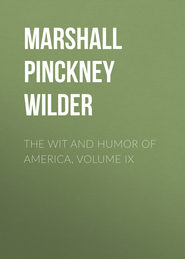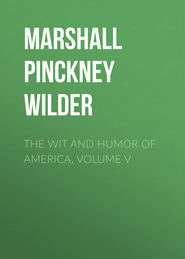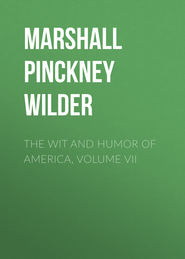По всем вопросам обращайтесь на: info@litportal.ru
(©) 2003-2024.
✖
The Wit and Humor of America, Volume VI
Автор
Год написания книги
2019
Настройки чтения
Размер шрифта
Высота строк
Поля
"To give you an idea, suh," he continued, "of what we Southern people suffe'd immediately after the fall of the Confederacy, let me state a case that came under my own observation.
"Coloner Temple Talcott of F'okeer County, Virginia, came into Talcottville one mornin', suh,—a town settled by his ancestors,—ridin' upon his horse—or rather a mule belongin' to his overseer. Colonel Talcott, suh, belonged to one of the vehy fust families in Virginia. He was a son of Jedge Thaxton Talcott, and grandson of General Snowden Stafford Talcott of the Revolutionary War. Now, suh, let me tell you right here that the Talcott blood is as blue as the sky, and that every gentleman bearin' the name is known all over the county as a man whose honor is dearer to him than his life, and whose word is as good as his bond. Well, suh, on this mornin' Colonel Talcott left his plantation in charge of his overseer,—he was workin' it on shares,—and rode through his estate to his ancestral town, some five miles distant. It is true, suh, these estates were no longer in his name, but that had no bearin' on the events that followed; he ought to have owned them, and would have done so but for some vehy ungentlemanly fo'closure proceedin's which occurred immediately after the war.
"On arriving at Talcottville the colonel dismounted, handed the reins to his servant,—or perhaps one of the niggers around de do'—and entered the post-office. Now, suh, let me tell you that one month befo', the Government, contrary to the express wishes of a great many of our leadin' citizens, had sent a Yankee postmaster to Talcottville to administer the postal affairs of the town. No sooner had this man taken possession than he began to be exclusive, suh, and to put on airs. The vehy fust air he put on was to build a fence in his office and compel our people to transact their business through a hole. This in itself was vehy gallin', suh, for up to that time the mail had always been dumped out on the table in the stage office and every gentleman had he'ped himself. The next thing was the closin' of his mail bags at a' hour fixed by himself. This became a great inconvenience to our citizens, who were often late in finishin' their correspondence, and who had always found our former postmaster willin' either to hold the bag over until the next day, or to send it across to Drummondtown by a boy to catch a later train.
"Well, suh, Colonel Talcott's mission to the post-office was to mail a letter to his factor in Richmond, Virginia, on business of the utmost importance to himself,—namely, the raisin' of a small loan upon his share of the crop. Not the crop that was planted, suh, but the crop that he expected to plant.
"Colonel Talcott approached the hole, and with that Chesterfieldian manner which has distinguished the Talcotts for mo' than two centuries, asked the postmaster for the loan of a three-cent postage stamp.
"To his astonishment, suh, he was refused.
"Think of a Talcott in his own county town bein' refused a three-cent postage stamp by a low-lived Yankee, who had never known a gentleman in his life! The colonel's first impulse was to haul the scoundrel through the hole and caarve him; but then he remembered that he was a Talcott and could not demean himself, and drawin' himself up again with that manner which was grace itself he requested the loan of a three-cent postage stamp until he should communicate with his factor in Richmond, Virginia; and again he was refused. Well, suh, what was there left for a high-toned Southern gentleman to do? Colonel Talcott drew his revolver and shot that Yankee scoundrel through the heart, and killed him on the spot.
"And now, suh, comes the most remarkable part of the story. If it had not been for Major Tom Yancey, Jedge Kerfoot and myself, there would have been a lawsuit."
Fitz lay back in his chair and roared.
"And they did not hang the colonel?"
"Hang a Talcott! No, suh; we don't hang gentlemen down our way. Jedge Kerfoot vehy properly charged the coroner's jury that it was a matter of self-defense, and Colonel Talcott was not detained mo' than haalf an hour."
The colonel stopped, unlocked a closet in the sideboard, and produced a black bottle labeled in ink, "Old Cherry Bounce, 1848."
"You must excuse me, gentlemen, but the discussion of these topics has quite unnerved me. Allow me to share with you a thimbleful."
Fitz drained the glass, cast his eyes upward, and said solemnly, "To the repose of the postmaster's soul."
LOVE SONNETS OF AN OFFICE BOY
BY S.E. KISER
I
Oh, if you only knowed how much I like
To stand here, when the "old man" ain't around,
And watch your soft, white fingers while you pound
Away at them there keys! Each time you strike
It almost seems to me as though you'd found
So me way, while writin' letters, how to play
Sweet music on that thing, because the sound
Is something I could listen to all day.
You're twenty-five or six, and I'm fourteen,
And you don't hardly ever notice me—
But when you do, you call me Willie! Gee,
I wisht I'd bundles of the old long green
And could be twenty-eight or nine or so,
And something happened to your other beau.
VI
When you're typewritin' and that long-legged clerk
Tips back there on his chair and smiles at you,
And you look up and get to smilin', too,
I'd like to go and give his chair a jerk
And send him flyin' till his head went through
The door that goes out to the hall, and when
They picked him up he'd be all black and blue
And you'd be nearly busted laughin' then.
But if I done it, maybe you would run
And hold his head and smooth his hair and say
It made you sad that he got dumped that way,
And I'd get h'isted out for what I done—
I wish that he'd get fired and you'd stay
And suddenly I'd be a man some day.
VIII
This morning when that homely, long-legged clerk
Come in he had a rose he got somewhere;
He went and kind of leaned against her chair,
Instead of goin' on about his work,
And stood around and talked to her a while,
Because the boss was out,—and both took care
To watch the door; and when he left her there
He dropped the flower with a sickish smile.
I snuck it from the glass of water she
Had stuck it in, and tore it up and put
It on the floor and smashed it with my foot,
When neither him nor her was watchin' me—
I'd like to rub the stem acrost his nose,
And I wish they'd never be another rose.
XIII
Last night I dreamed about her in my sleep;
I thought that her and me had went away
Out on some hill where birds sung 'round all day,
And I had got a job of herdin' sheep.
I thought that she had went along to keep
Me comp'ny, and we'd set around for hours
Just lovin', and I'd go and gather flowers
And pile them at her feet, all in a heap.
It seemed to me like heaven, bein' there
With only her besides the sheep and birds,
And us not sayin' anything but words
"Coloner Temple Talcott of F'okeer County, Virginia, came into Talcottville one mornin', suh,—a town settled by his ancestors,—ridin' upon his horse—or rather a mule belongin' to his overseer. Colonel Talcott, suh, belonged to one of the vehy fust families in Virginia. He was a son of Jedge Thaxton Talcott, and grandson of General Snowden Stafford Talcott of the Revolutionary War. Now, suh, let me tell you right here that the Talcott blood is as blue as the sky, and that every gentleman bearin' the name is known all over the county as a man whose honor is dearer to him than his life, and whose word is as good as his bond. Well, suh, on this mornin' Colonel Talcott left his plantation in charge of his overseer,—he was workin' it on shares,—and rode through his estate to his ancestral town, some five miles distant. It is true, suh, these estates were no longer in his name, but that had no bearin' on the events that followed; he ought to have owned them, and would have done so but for some vehy ungentlemanly fo'closure proceedin's which occurred immediately after the war.
"On arriving at Talcottville the colonel dismounted, handed the reins to his servant,—or perhaps one of the niggers around de do'—and entered the post-office. Now, suh, let me tell you that one month befo', the Government, contrary to the express wishes of a great many of our leadin' citizens, had sent a Yankee postmaster to Talcottville to administer the postal affairs of the town. No sooner had this man taken possession than he began to be exclusive, suh, and to put on airs. The vehy fust air he put on was to build a fence in his office and compel our people to transact their business through a hole. This in itself was vehy gallin', suh, for up to that time the mail had always been dumped out on the table in the stage office and every gentleman had he'ped himself. The next thing was the closin' of his mail bags at a' hour fixed by himself. This became a great inconvenience to our citizens, who were often late in finishin' their correspondence, and who had always found our former postmaster willin' either to hold the bag over until the next day, or to send it across to Drummondtown by a boy to catch a later train.
"Well, suh, Colonel Talcott's mission to the post-office was to mail a letter to his factor in Richmond, Virginia, on business of the utmost importance to himself,—namely, the raisin' of a small loan upon his share of the crop. Not the crop that was planted, suh, but the crop that he expected to plant.
"Colonel Talcott approached the hole, and with that Chesterfieldian manner which has distinguished the Talcotts for mo' than two centuries, asked the postmaster for the loan of a three-cent postage stamp.
"To his astonishment, suh, he was refused.
"Think of a Talcott in his own county town bein' refused a three-cent postage stamp by a low-lived Yankee, who had never known a gentleman in his life! The colonel's first impulse was to haul the scoundrel through the hole and caarve him; but then he remembered that he was a Talcott and could not demean himself, and drawin' himself up again with that manner which was grace itself he requested the loan of a three-cent postage stamp until he should communicate with his factor in Richmond, Virginia; and again he was refused. Well, suh, what was there left for a high-toned Southern gentleman to do? Colonel Talcott drew his revolver and shot that Yankee scoundrel through the heart, and killed him on the spot.
"And now, suh, comes the most remarkable part of the story. If it had not been for Major Tom Yancey, Jedge Kerfoot and myself, there would have been a lawsuit."
Fitz lay back in his chair and roared.
"And they did not hang the colonel?"
"Hang a Talcott! No, suh; we don't hang gentlemen down our way. Jedge Kerfoot vehy properly charged the coroner's jury that it was a matter of self-defense, and Colonel Talcott was not detained mo' than haalf an hour."
The colonel stopped, unlocked a closet in the sideboard, and produced a black bottle labeled in ink, "Old Cherry Bounce, 1848."
"You must excuse me, gentlemen, but the discussion of these topics has quite unnerved me. Allow me to share with you a thimbleful."
Fitz drained the glass, cast his eyes upward, and said solemnly, "To the repose of the postmaster's soul."
LOVE SONNETS OF AN OFFICE BOY
BY S.E. KISER
I
Oh, if you only knowed how much I like
To stand here, when the "old man" ain't around,
And watch your soft, white fingers while you pound
Away at them there keys! Each time you strike
It almost seems to me as though you'd found
So me way, while writin' letters, how to play
Sweet music on that thing, because the sound
Is something I could listen to all day.
You're twenty-five or six, and I'm fourteen,
And you don't hardly ever notice me—
But when you do, you call me Willie! Gee,
I wisht I'd bundles of the old long green
And could be twenty-eight or nine or so,
And something happened to your other beau.
VI
When you're typewritin' and that long-legged clerk
Tips back there on his chair and smiles at you,
And you look up and get to smilin', too,
I'd like to go and give his chair a jerk
And send him flyin' till his head went through
The door that goes out to the hall, and when
They picked him up he'd be all black and blue
And you'd be nearly busted laughin' then.
But if I done it, maybe you would run
And hold his head and smooth his hair and say
It made you sad that he got dumped that way,
And I'd get h'isted out for what I done—
I wish that he'd get fired and you'd stay
And suddenly I'd be a man some day.
VIII
This morning when that homely, long-legged clerk
Come in he had a rose he got somewhere;
He went and kind of leaned against her chair,
Instead of goin' on about his work,
And stood around and talked to her a while,
Because the boss was out,—and both took care
To watch the door; and when he left her there
He dropped the flower with a sickish smile.
I snuck it from the glass of water she
Had stuck it in, and tore it up and put
It on the floor and smashed it with my foot,
When neither him nor her was watchin' me—
I'd like to rub the stem acrost his nose,
And I wish they'd never be another rose.
XIII
Last night I dreamed about her in my sleep;
I thought that her and me had went away
Out on some hill where birds sung 'round all day,
And I had got a job of herdin' sheep.
I thought that she had went along to keep
Me comp'ny, and we'd set around for hours
Just lovin', and I'd go and gather flowers
And pile them at her feet, all in a heap.
It seemed to me like heaven, bein' there
With only her besides the sheep and birds,
And us not sayin' anything but words








